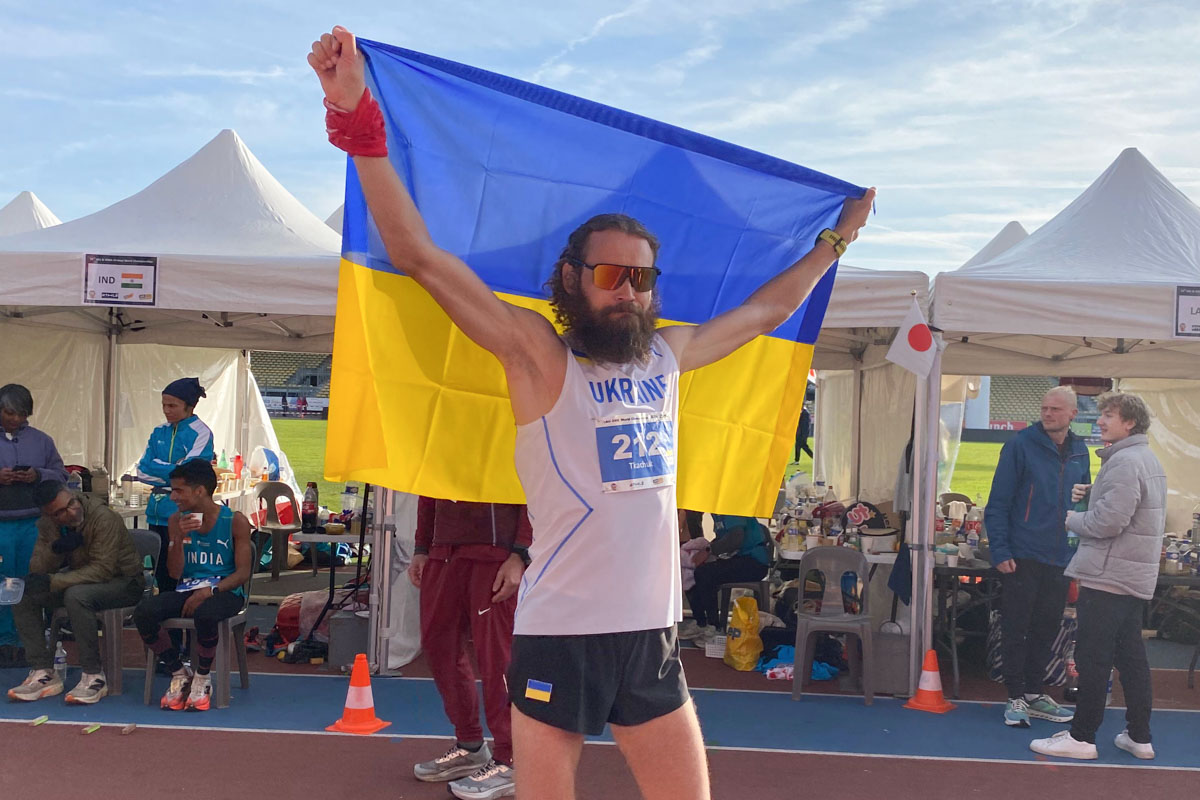At 10 a.m. local time on Saturday, October 18, 366 athletes from 45 countries started the 2025 IAU 24-Hour World Championships in Albi, France. In the end, it was Sarah Webster of Great Britain setting a new women’s 24-hour world record and Andrii Tkachuk of Ukraine winning the men’s race. The two ran 278.622 kilometers (173.127 miles) and 294.346 kilometers (182.898 miles), respectively.
It was a huge effort for Webster, who surpassed the prior record of 270.363k (167.996 miles), held by Japan’s Miho Nakata, around 9 a.m. on Sunday morning, with still an hour of racing to go. She was able to add 8.259k (5.131 miles) to the record. Webster was the bronze medalist at the 2024 IAU 100k World Championships and ran her very first 24-hour race in April this year, recording 243.393k (151.237 miles) to qualify for this race.
In the men’s race, Tkachuk won convincingly, with a nearly nine-kilometer (5.6 miles) gap on second place. The distance was well short of the world record of 319.614k (198.598 miles), which was set by Aleksandr Sorokin (Lithuania) at the 2022 IAU 24-Hour European Championships. Tkachuk is no stranger to this event and was third at the 2023 IAU 24-Hour World Championships when he ran 284.540k (176.804 miles). His personal best is 295.363k (183.530 miles), which he set at the 2022 IAU 24-Hour European Championships.
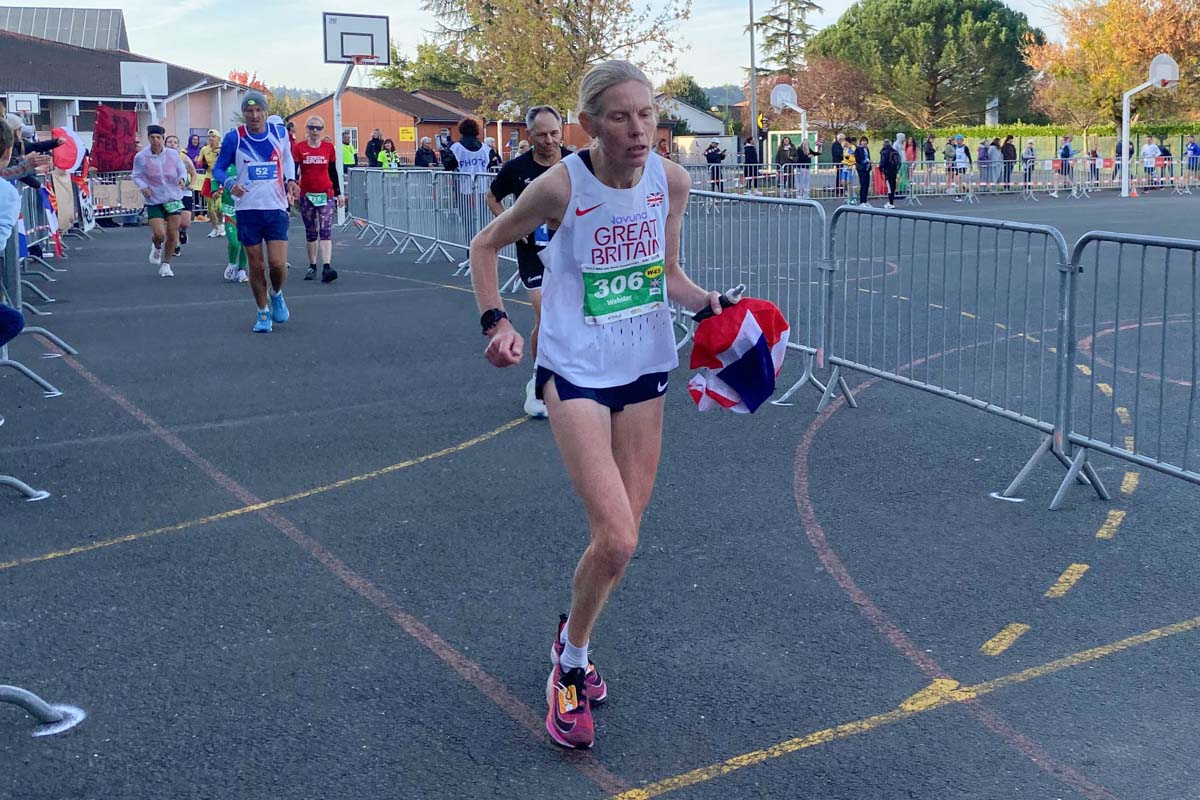
Sarah Webster of Great Britain setting a new world record at the 2025 IAU 24-Hour World Championships. Photo: iRunFar/Deki Fourcin
On race day, the sky was a brilliant blue, and supporters were out in force as the procession of brightly clad athletes streamed out of the start line and around the Albi stadium. The sun rose higher in the sky, and the balmy morning quickly gave way to heat. By midday, many athletes resorted to ice bandanas and drenching themselves in water to keep cool as they made their way around the 1.5-kilometer (0.93 miles) loop.
When night fell around 7 p.m., and the temperature began to drop, there was a palpable shift in energy. Calmness set in as runners prepared for a long night out. A large group of French supporters lifted the mood, treating the runners to a rousing soundtrack of “YMCA” to the beat of a large array of makeshift percussion. For a brief moment, some athletes seemed to forget about the race, and all arms moved as one to the instantly recognizable song.
As sunrise came after a long night, the leaders had solidified their leads, while the race for the other podium spots remained close. Read on to see how the races played out.
2025 IAU 24-Hour World Championships Women’s Race
Sarah Webster (Great Britain), in only her second attempt at a 24-hour event, ran a perfect race. She spent the first five hours toward the back of the top 10 before moving gradually up the field. Webster broke into the top five around nine hours elapsed and then took the lead around 17 hours. For the remaining seven hours, she ran in front with a combination of impressive strength, talent, and race management, carrying her farther than any other woman had ever gone in 24 hours. When Webster broke the previous record, with just over an hour left in the race, she barely slowed down to acknowledge the moment, simply taking the flag and carrying on in the pursuit of her next goal. Check out our post-race interview with Webster to hear her perspective on her race.
Mascha Rondhuis of The Netherlands took the early lead, running ahead of the field for the first two hours and covering a quick 27k (17 miles). Just behind her was defending champion and world-record holder Miho Nakata of Japan, followed by Carmen Maria Pérez of Spain, who covered the distance about two minutes slower. Holly Ranson (Australia) was about five minutes in arrears when she reached the same distance, with Noora Honkala (Finland) another minute behind.
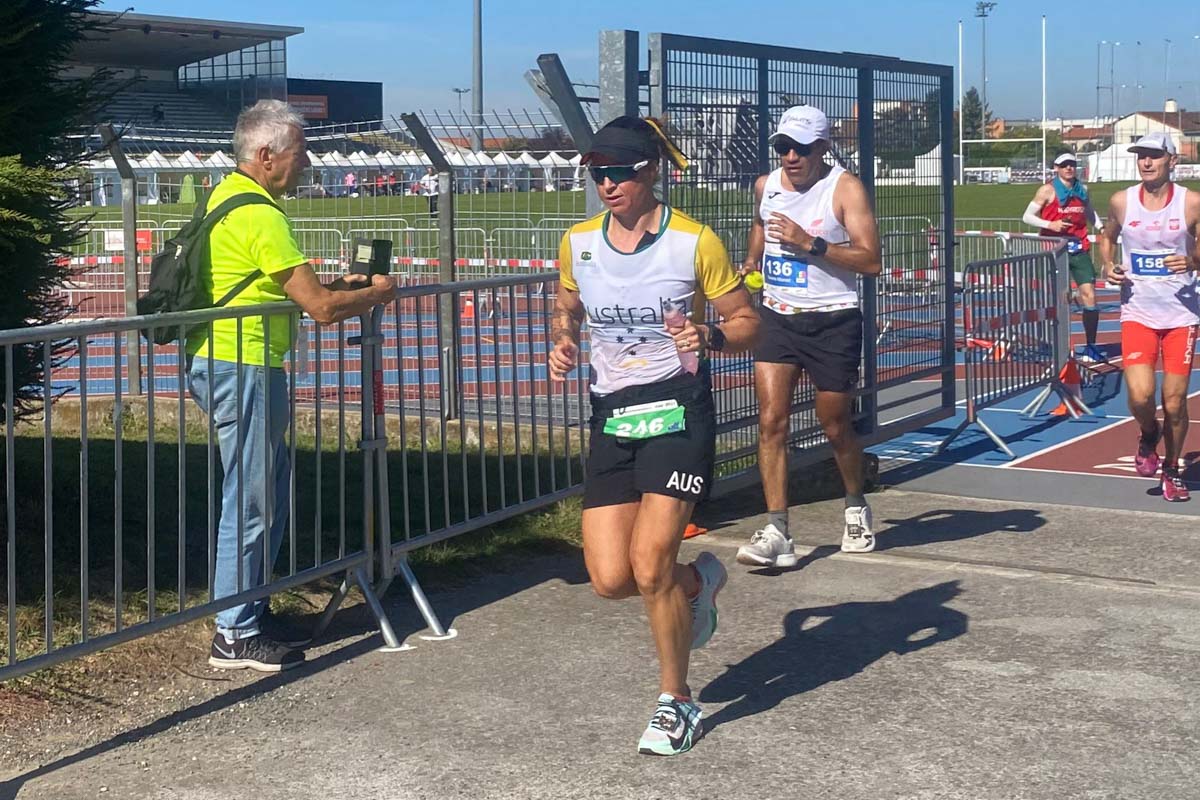
Holly Ranson of Australia during the 2025 IAU 24-Hour World Championships, where she would take second. Photo: iRunFar/Deki Fourcin
Over the next few hours, early leader Rondhuis began to fade through the rankings where she’d later finish mid-pack, leaving Nakata to take the lead. As the clock struck 4 p.m. Saturday, a quarter of the way through the race, Nakata had covered approximately 77k (48 miles). Pérez was around a lap behind her, with third to fifth place, composed of Honkala, Ranson, and Maria Zahaiska (Ukraine), all within another lap.
From here, Honkala began to tire, dropping steadily down the field before later stopping, at which point Webster moved into fifth place with about nine hours elapsed and 108k (67 miles) covered.
At the halfway point, Nakata remained in the lead, having covered about 147k (91 miles). The rest of the top five were very close behind, however, with around a 1.5k (0.9 miles) lap separating her from Ranson in second place. Zahaiska was a further lap back, with Webster, who had moved past Pérez into fourth, less than a lap behind podium position.
Webster continued to climb up through the field, overtaking Nakata around 3 a.m. Sunday morning, with 17 hours on the clock. Ranson had also moved past Nakata into second place. Their one-two-three positions would remain unchanged for the rest of the race, with Webster gradually pulling away, and Ranson and Nakata following, never much more than a lap apart. Around 20 hours in, Kelsey Price (Great Britain) entered the top five, then moved past Pérez into fourth place. Zahaiska dropped down the field, eventually finishing outside the top 25.

Defending women’s champion Miho Nakata (Japan) running at the 2025 IAU 24-Hour World Championships, where she took third this time. Photo: iRunFar/Deki Fourcin
As the gun signaled the end of the race at 10 a.m. Sunday morning, Sarah Webster had set a new women’s 24-hour world record with a distance of 278.622k (173.127 miles).
Holly Ranson finished in second place, with a distance of 274.172k (173.127 miles), improving on her own personal best of 263.548k (163.761 miles), set this year at the Sri Chinmoy 24/48 Track Festival in Australia. Her finish was well past the prior world record.
Miho Nakata took bronze with a distance of 271.987k (169.004 miles) and in doing so, edged past her own personal best and previous world record of 270.363k (167.996 miles).
Incredibly, these three women exceeded the prior world record mark with their performances. Also incredibly, this is the fourth consecutive time that the women’s world record has been broken at an IAU 24-Hour World Championships.
Kelsey Price ran consistently in the closing hours to finish strongly in fourth place with a distance of 257.129k (159.772 miles), well over her previous personal best of 231.820k (144 miles).
Patrycja Bereznowska (Poland) rounded off the top five, having passed Pérez in the last two hours. Her finishing distance was 251.371k (156.194 miles), under her personal best and previous world record of 259.991k (161.551 miles) set at the 2017 IAU 24-Hour World Championships.
2025 IAU 24-Hour World Championships Women’s Results
- Sarah Webster (Great Britain) – 278.622k (173.127 miles)
- Holly Ranson (Australia) – 274.172k (170.362 miles)
- Miho Nakata (Japan) – 271.987k (169.004 miles)
- Kelsey Price (Great Britain) – 257.129k (159.772 miles)
- Patrycja Bereznowska (Poland) – 251.371k (156.194 miles)
- Carmen Maria Pérez (Spain) – 249.480k (155.019 miles)
- Marisa Lizak (U.S.) – 247.190k (153.596 miles)
- Corrine Gruffaz (France) – 245.359k (152.459 miles)
- Ida Slorafoss (Norway) – 241.467k (150.040 miles)
- Katarzyna Chojnacka (Poland) – 238.305k (148.075 miles)
Women’s Team Results
- Great Britain
- Australia
- Japan
2025 IAU 24-Hour World Championships Men’s Race
Pascal Rüeger (Switzerland) took the lead early in the men’s race, creating a gap over the rest of the field after the first six hours by covering about 85.5k (53.1 miles). Behind him, Michal Šuľa (Slovakia) looked strong with 84k (52 miles) covered, followed closely by Felix Pont (Spain) about a kilometer back. Fotis Zisimopoulos (Greece), the 2023 silver medalist, was also in the top five after the first quarter of the race.
Similar to women’s winner Sarah Webster, Andrii Tkachuk (Ukraine) started the race conservatively. He ran within the top 10 for the first six hours before moving into fifth place as the evening set in with just over six hours on the clock. From this point on, Tkachuk moved rapidly through the ranks.
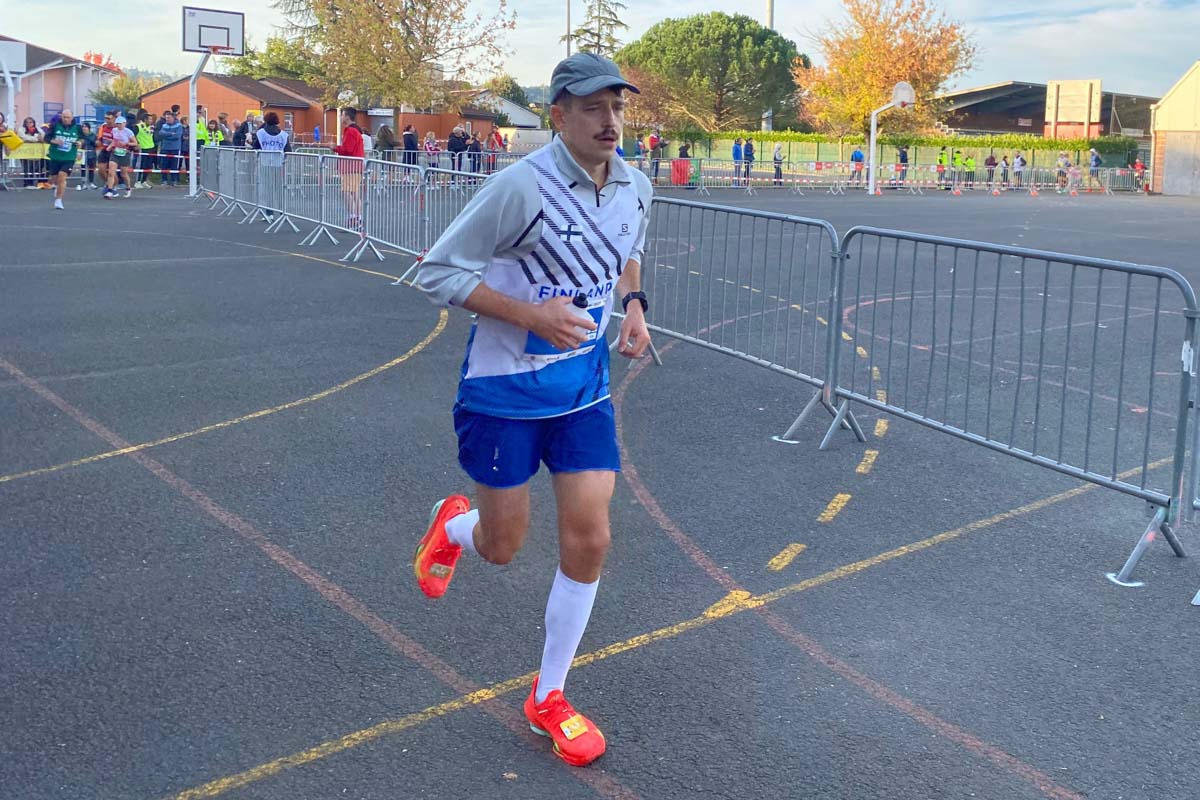
Matti Jonkka of Finland on his way to taking third at the 2025 IAU 24-Hour World Championships. Photo: iRunFar/Deki Fourcin
By 16 hours elapsed, Tkachuk had covered 211.5k (131 miles), and banked a lead of over 2.8k (1.7 miles) over the next runner, Támas Bódis (Hungary), who’d run about 207k (128 miles). By now, none of the other early leaders remained in the top five. This was due in large part to a number of abandons. Rüeger stopped at 7.5 hours after leading for a few laps into the race; Pont stopped at the halfway point; and Zisimopoulos stopped after 15 hours, after running within the top five for the prior nine hours. France’s Gabriel Noutary was now in third with 201k (125 miles) covered. Andrius Preibys of Lithuania was running in fourth place, having covered 198k (123 miles). Chris Kelly of Great Britain was fifth with 195k (121 miles).
More upsets were to come in the later stages of the night, however. After running in the top five for a while, Noutary, Preibys, and Kelly all slowed to finish outside the top 20. Meanwhile, Tkachuk increased his lead through the night, and by 20 hours elapsed, he had covered 261k (162 miles) and was over 12k (7 miles) ahead of second-place Bódis. Behind was Jo Inge Norum (Norway) at 239k (148 miles), now in third, with Matti Jonkka (Finland) sitting in fourth place with 234k (145 miles). They were followed closely by Emil Krog Ingerslev (Denmark) and Andrzej Piotrowski (Poland) in fifth and sixth places. Fourth to sixth places were separated by only a lap or so.
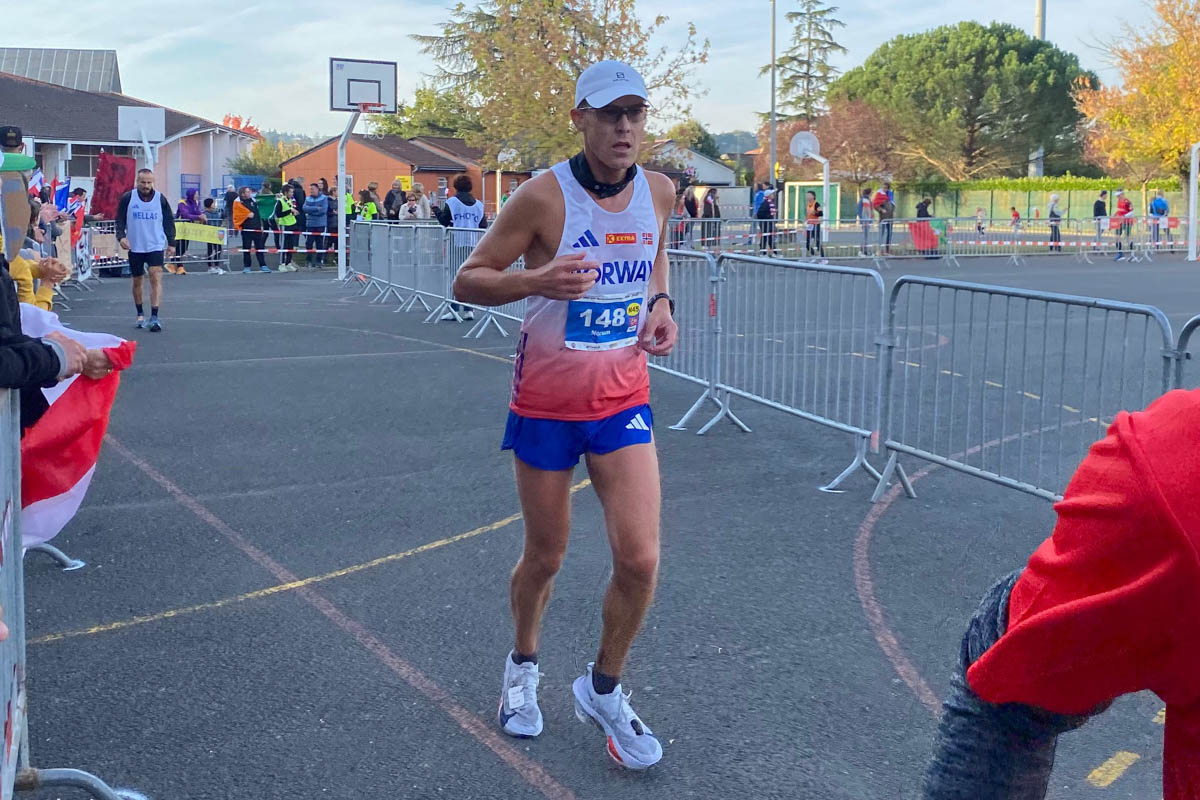
Norway’s Jo Inge Norum took second at the 2025 IAU 24-Hour World Championships. Photo: iRunFar/Deki Fourcin
Over the next few hours until the race end, the effort started to take its toll on Tkachuk, and he slowed down considerably in the final three hours of the race. However, his lead was such that it didn’t matter, and when the gun signaled that time was up, he was well clear of the rest. Andrii Tkachuk won with a final distance of 294.346 kilometers (182.898 miles). It’s worth noting that Tkachuk also finished the 2025 Trail World Championships Long Trail in Canfranc, Spain for Team Ukraine just three weeks ago — he must have recovered quickly!
Jo Inge Norum finished the race in second place, overtaking a struggling Bódis with just over half an hour to go to run a final distance of 285.513 kilometers (177.409 miles). This result greatly improves on his 252.250 kilometers (156.740 miles) run in the 2023 IAU 24-Hour World Championships.
Matti Jonkka also moved past Bódis in the final 30 minutes to finish in third place with a distance of 283.699 kilometers (176.282 miles). Jonkka’s prior personal best was from 2023 when he ran 223.735 kilometers (139.022 miles).
Támas Bódis finished in fourth place in 279.780 kilometers (173.847 miles), and Emil Krog Ingerslev rounded out the top five with 278.132 (172.823 miles).

Ukraine’s Andrii Tkachuk on his way to winning the 2025 IAU 24-Hour World Championships. Photo: iRunFar/Deki Fourcin
2025 IAU 24-Hour World Championships Men’s Results
- Andrii Tkachuk (Ukraine) – 294.346k (182.898 miles)
- Jo Inge Norum (Norway) – 285.513k (177.409 miles)
- Matti Jonkka (Finland) – 283.699k (176.282 miles)
- Támas Bódis (Hungary) – 279.780k (173.847 miles)
- Emil Krog Ingerslev (Denmark) – 278.132k (172.823 miles)
- Andrzej Piotrowski (Poland) – 274.313k (170.450 miles)
- Radek Brunner (Czech Republic) – 271.182k (168.504 miles)
- Tomi Ronkainen (Finland) – 269.788k (167.638 miles)
- Diego Filiu (France) – 266.554k (165.628 miles)
- Geeno Antony (India) – 265.198k (164.786 miles)
Men’s Team Results
- Finland
- France
- Poland

